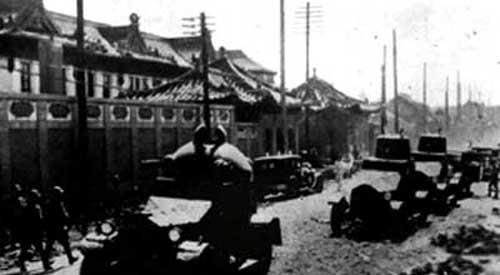The policy of appeasement was a policy adopted by Britain, the United States, France and other countries before the outbreak of The Second World War in the face of aggressors. In the face of the wars of aggression provoked by Germany, Japan, Italy, and other countries, these powerful countries at that time adopted an attitude of appeasement and connivance, and they sacrificed the legitimate interests of China, Czechoslovakia, and other shrinking countries in an attempt to save their own interests. But in the end, the development of events far exceeded their expectations, and the outbreak of a world war could not be blamed on these countries.
On September 18, 1931, the Japanese fascists launched a war of aggression against northeast China, and the three eastern provinces soon fell and were occupied by the Japanese army. At that time, under the control of Britain, France and other countries, the League of Nations went so far as to demand that the two sides stop all conflicts, withdraw their troops, and designate the northeast as an "unarmed area" under international co-management. Finally, after eight months of investigation by the head of the League of Nations investigation, they proposed the establishment of an autonomous government here, and their idea was that the Western powers would replace Japan to slaughter the Northeast.

Of course, Japan did not agree, and subsequently withdrew from the League of Nations. However, the Western powers did not take any coercive measures to contain Japan, which led to the intensification of Japan's efforts and the launch of a full-scale war against China in 1937. Even more absurd, British Prime Minister Neville Chamberlain even advocated financial assistance for Japan to develop northeast and north China. In this way, it is attempted to preserve Britain's interests in China. But they underestimated the ambitions of the Japanese, and the Pacific War provoked by Japan in 1941 eventually burned the flames of war on themselves.
In October 1935, Italy sent troops to Abyssinia (Ethiopia) and in May of the following year occupied Abyssinia with a down payment of AttisAbaba. In the face of this Italian act, although the League of Nations openly issued a declaration to protest, the actual measures taken were the embargo that did not include oil. The invaded country of Abyssinia refused any assistance. Doing so was tantamount to supporting Italy's aggression in disguise, and Hitler was greatly encouraged.
In 1936, the Spanish fascists Franco launched a rebellion aimed at overthrowing the Republican government. Under the pretext of opposing the "communist threat," Germany and Italy sent troops to interfere in Spain's internal affairs. Britain and France, fearing that Spain's war would burn on them, also adopted a "policy of non-interference." The French Government, on the other hand, has proposed a Non-Interference Agreement, which includes a ban on the export and transit of all kinds of arms and military materiel to Spain and its territories, as well as a ban on the transit of weapons purchased by Spain. This agreement was agreed to by 27 european countries. But the rebels in Spain received a large number of weapons from Germany and Italy. As a result of the western comparison and connivance, Germany and Italy signed the Berlin Agreement, establishing the Berlin-Roman axis.
On 7 March 1936, the German government abrogated the Locarno Convention and continued its armaments. From 1937 to 1938, Germany completed the annexation of Austria. Austria itself was an ally of Britain and France, and according to the regulations, Britain and France were obliged to guarantee Austria, but after the annexation of Austria, the two countries only protested superficially, but in fact recognized the fact that Austria was annexed, and the withdrawal of the embassy in Austria was the best proof. Through this incident, Hitler saw more clearly the bottom card of the appeasement policy of the Western powers and became more unscrupulous.
After the annexation of Austria, Hitler pointed the spearhead of aggression at Czechoslovakia and deliberately created friction. In order to resolve the contradictions between the two countries, led by Britain and France, from September 29 to 30, 1938, the heads of state of Britain, France, Nazi Germany and Italy, Neville Chamberlain, Daladi, Hitler and Mussolini, met in Munich, at which the infamous Munich Agreement was signed. Britain and France, at the expense of Czechoslovakia's interests, temporarily bought what they saw as peace.
Subsequently, in March 1939, Germany sent troops to occupy Czechoslovakia, and Britain and France were once again punched in the face. However, germany, Japan, and Italy, which were full of encouragement, stepped up preparations for the war and set off a major war that swept the whole world. It was not until the second world broke out in full force, when Britain and France were also facing the threat of fascism, that they were forced to abandon their policy of appeasement and devote themselves to the war against the fascist countries. At this time, China and other countries invaded by the fascists, after being humiliated, had begun to pursue an independent war of resistance.
Let's analyze the UK. The appeasement policy adopted by France, the United States, and other countries shows that if the fascist countries were to strike at the very beginning of their aggression, they would certainly be a great deterrent to these fascist countries, and the Second World War might not have happened, or would not have developed so rapidly and caused so much harm. However, in order to safeguard their own interests, these countries have given up their due responsibilities as world powers, and have not hesitated to sacrifice the interests of small countries and even their own allies to seek temporary stability. However, it fueled the arrogance of the fascist invaders, and the whole world fell into this great war step by step!